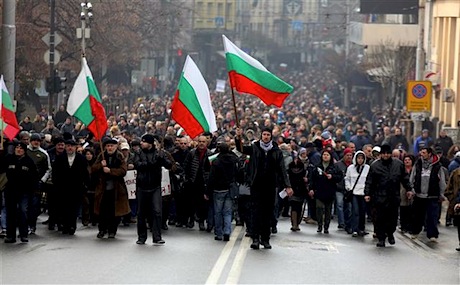Europe
Eastern Europe: Mass protests topple Bulgarian government, zombie uprising in Slovenia

Mass protest in Sofia, Bulgaria's capital, February 17, 2013.
Jean-Luc Mélenchon, Die Linke salute Hugo Chavez's socialist vision
Above: March 6 press conference by Jean-Luc Mélenchon (Front de Gauche, Left Front) on the death of Venezuela's President Hugo Chávez Frias.
l’Humanité interview with Jean-Luc Mélenchon, spokesperson Front de Gauche (Left Front), France, translated by Dick Nichols
March 7, 2013 -- You have always supported the revolutionary process in the Venezuela, why?
We need to place the Bolivarian Revolution in its continental and historical context. The collapse of state communism was presented to the whole world as the end of history for communist and socialist sentiment and aspiration. But the flame flared up again in South America because the new age of capitalism had made that continent its proving ground. Neoliberalism was tried out there by military dictatorships on the one hand and by Operation Condor and CIA acts of violence on the other. The policies which then got applied were the same everywhere: free and unbridled competition, monetarism and deregulation, leading the whole continent to disaster. It is in this context that the revolutionary flame flared up again. Bolivarian Venezuela has occupied a special place: not only has been it been built on democratic foundations, but it has outmaneuvered the criminal plans of the opponent by peaceful and popular action.
Left Bloc: 'Portugal’s left must respond to a rising tide of rebellion' (updated March 14)

According to rally coordinators, some 500,000 protesters filled the Lisbon boulevard leading to the Finance Minis
Sortu and Basque left nationalism’s strategic relaunch

For more coverage of the Basque struggle, click HERE. For more on Spain, click HERE.
By Dick Nichols
March 5, 2013 – Links International Journal of Socialist Renewal -- Nearly 10 years after the Spanish high court outlawed its previous political organisations, Basque left nationalism has finally given birth to a new legal party—Sortu (“to create” or “to be born” in Basque). The new arrival is a powerful progressive force for Basque independence—socialist, feminist, ecologically aware and staunchly internationalist.
Its goal is an independent socialist Basque-speaking state that unites the three northern Basque regions in the French department of Pyrenees Atlantiques with the four southern Basque regions covering Navarra and Euskadi (the Basque Autonomous Community) in the Spanish state.
France: New Anti-Capitalist Party congress wrestles with challenge of the Left Front

[Click HERE for more analysis and discussion of French politics.]
By Dick Nichols
February 15, 2013 – Links international Journal of Socialist Renewal -- The four years since the founding of France’s New Anti-Capitalist Party (NPA) have been a roller coaster rise and fall for the organisation, which was created in 2009 on the initiative of the Revolutionary Communist League (LCR), the former French section of the Trotskyist Fourth International.
The party’s rapid early growth seemed to confirm the premise on which it was founded — tens of thousands of France's workers and young people wanted to get active against capitalism’s crises and crimes, but were wary of existing left organisations and looking for a new sort of political home.
Basque Country: Movement for sovereignty and socialism on the rise

For more coverage of the Basque struggle, click HERE.
France: As Hollande takes the social-liberal road, what prospects for the left?

France's Socialist Party President Francois Hollande with the Left Front's Jean-Luc Melenchon.
Catalonia: Fight over right to decide political future intensifies

[For more coverage of Catalonia, click HERE, and
To the crucible: an Irish engagement with the Greek crisis and the Greek left

Syriza poster, Synaspismos office in Athens, Helena Sheehan on the streets with Syriza in Athens.
[For more discussion of SYRIZA, click HERE.]
By Helena Sheehan
January 21, 2013 -- Irish Left Review, posted at Links International Journal of Socialist Renewal at the author's suggestion and with her permission -- A monumental drama is playing out before our eyes. It is a true Greek tragedy. The plot: A society is being pushed to its limits. The denouement is not yet determined, but survival is at stake and prospects are precarious. Greece is at the sharp end of a radical and risky experiment in how far accumulation by dispossession can go, how much expropriation can be endured, how far the state can be subordinated to the market. It is a global narrative, but the story is a few episodes ahead here.
Greece: Stathis Kouvelakis on tasks facing SYRIZA following its electoral breakthrough
December 7, 2012 -- Socialist Resistance -- The London branch of SYRIZA hosted a public meeting, "Shock therapy and popular uprising: Greece at the Crossroads", on December 7, 2012. Videos of the four keynote speakers Costas Douzinas, Stathis Kouvelakis, Seumas Milne and Marina Prentoulis are available.
Above, Stathis Kouvelakis sets out the tasks facing SYRIZA following its electoral breakthrough.
Other speakers were (to view the videos click on the links below):
Seumas Milne argues that the neoliberal capitalist model is facing defeat due to the resistance it is creating and its failure to end austerity.
Marina Prentoulis explains the relationship between SYRIZA’s electoral advances and the movement on the streets.
